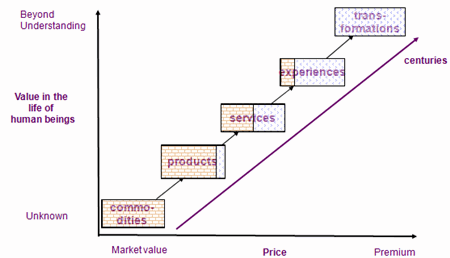Experiences
In a world in which all products can be compared, in a world in which services are easier to compare, the consumer starts comparing price, the consumer starts to consider products and services as commodities. And is only rarely willing to pay for extras of which the added value is not totally clear. In that world a consumer is only willing to pay a premium for memorable experiences: special experiences which the consumer keeps talking about. Pine & Gilmore wrote a book that laid the foundation for these thoughts:

This figure shows how the economy developed, and what next steps are coming. The economy started with barter trade. In those days we exchanged herbs, stones, or grains we harvested from the earth. Or gold! We had no idea what it was ‘worth’ until we discovered we had something others would like to have. There appeared to be a form of scarcity. Because of that, we could exchange a little bit of gold for great amounts of other substances. In the next phase we started making products. First by hand, later through machines. It was the time for marketing with all her P’s to develop. Especially when mass communication media like radio, and later TV, developed. In the next phase the service economy was shaped. Services which were marketed as special products. And which we could load with brand values. The figure shows that we slowly grow into an era in which people want to pay for special experiences. For something that makes them experience something extraordinary, for something that touches them, for something that teaches them. Then an era follows in which it is all about transformations. Transformations are all about really changing people: from bully on the street to soccer hero, from graduate student to CEO, from music illiterate to virtuoso. This takes a long term commitment. Not just from the consumer, but also from the companies that coach them. We are not that far yet though. For the time being, we will be fully occupied by the experience economy.
My belief is that the experience economy will mainly develop in the virtual world. When Pine & Gilmore’s book was published, the marketing world started inventing all kinds of events that could keep the consumer busy all nights and weekends. I don’t believe in this. I believe people want experiences on demand. At the moment they want it. And considering their personal situation. Then we talk about high-quality interactive content on demand. And not behind a PC, but life-sized (holographic) projected, and reacting to all our actions. The fact that the gaming industry already is bigger than the film industry says enough about the willingness of the consumer to pay for content. The quality and diversity of (interactive) content will completely explode over the years to come. We will be offered virtual experiences which are more impressive than we could ever imagine. Which in the end will look so real, that we don’t even know if we experienced it in the physical world or in the virtual world. And which we will (severely) pay for. Just because we think it is worth it.
As a consequence, the virtual component of the economy will grow. More and more people will be working in what we now call (new) media. With all kinds of specialization. And they will work together worldwide to develop extraordinary experiences for people, who will carry these for the rest of their lives. That is the essence of the experience economy.
Latest observations for Experiences
- Google Music: another chapter in paying for content
- Xing makes a lot of money from paying members
- Justin TV lets you watch soccer together
- Elf Your Self X-Mas card download for $4.99
- Your own Wuzzon-ringtone in GTST
- Jaap lets people place their own homes
- Beslist.nl launches selection wizard
- WhereIGo: gaming in the real world
- Ejai coaches you with experiences
- Second Life on your cell phone
Latest observations for Experiences (in Dutch)
- Xing verdient flink aan betalende leden
- Justin TV laat je samen voetbal kijken
- Elf Your Self X-Mas kaart download voor $4.99
- Je eigen Wuzzon-ringtone in GTST
- Disney World in Google Earth
- WhereIGo: gamen in de echte wereld
- IOC zet Olympische spelen op YouTube
- Ejai coacht je met ervaringen
- Apenhersenen besturen robotarm
- Second Life op mobiel